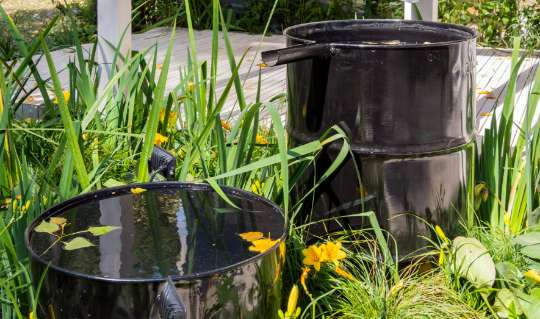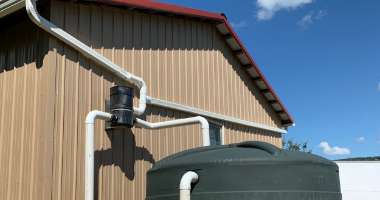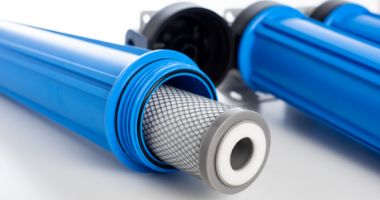Water conservation is one of the many benefits of rainwater harvesting. By capturing rainwater, we're tapping into a natural and renewable resource, directly reducing our reliance on traditional water supply systems. This shift is crucial at a time when water scarcity is becoming an issue across the globe. Rainwater harvesting does more than offer a supplementary water source. It represents a significant step toward a more sustainable and resilient water management strategy.
The process of rainwater harvesting directly reduces the demand on municipal water supplies. Every gallon of rainwater collected and used for residential, business, or industrial applications is a gallon less that needs to be processed, treated, and transported by the city's water system.
This reduction in demand also conserves energy, given the substantial power required for water treatment and distribution processes. By utilizing rainwater for various purposes, we're also decreasing the amount of treated drinking water used for tasks that don't necessarily require potable water, thereby enhancing the efficiency of our overall water use.
Beyond reducing demand on traditional systems, rainwater harvesting is pivotal in preserving local water resources. In regions where water scarcity is a critical concern, the ability to collect and store rainwater for future use can be vital. This practice helps maintain the balance of local aquifers, rivers, and lakes by mitigating the need to draw excessively from these sources, especially during peak demand periods.

The benefits of rainwater collection include several environmental advantages. By channeling rainwater from rooftops and landscapes into storage tanks, we're engaging in a practice that has a positive ripple effect on our natural surroundings.
This sustainable method is crucial for reducing surface runoff, a common issue that can lead to soil erosion and the degradation of local waterways. By capturing rainwater before it hits the ground and becomes runoff, we're effectively minimizing the potential for erosion, preserving soil integrity, and protecting the habitats of countless organisms.
Rainwater harvesting also affects local aquatic environments. Usually, as rainwater flows over surfaces, it picks up pollutants, including pesticides, fertilizers, and oils, eventually carrying these harmful substances into rivers, lakes, and streams. This process can severely affect water quality, harming aquatic life and disrupting ecosystems. However, by intercepting rainwater and putting it to use, we significantly reduce the volume of polluted runoff entering these water bodies. This helps maintain cleaner rivers and lakes and supports biodiversity by providing a safer environment for fish, amphibians, and other aquatic species.
By collecting rainwater, we're able to lessen the amount of untreated stormwater that directly enters our waterways, reducing the load of pollutants and improving the overall health of our water resources. This reduction in stormwater runoff is essential in urban areas, where impervious surfaces are abundant and natural filtration is limited. By implementing rainwater harvesting, communities directly mitigate water pollution, showcasing how local actions can lead to substantial environmental improvements.

Often forgotten among the advantages of rainwater harvesting are the potential energy savings. The journey of water from its source to our taps is energy-intensive, involving extensive pumping, treatment, and transportation processes. Each of these steps consumes a significant amount of energy, contributing to the overall energy footprint of municipal water systems. Integrating rainwater harvesting into our daily routines reduces the energy demand of bringing water to our homes and businesses.
One of the most compelling aspects of rainwater harvesting is the potential for energy efficiency through gravity-fed systems. Unlike traditional water systems that rely heavily on pumps to move water, gravity-fed rainwater systems harness the natural force of gravity to distribute water, especially for outdoor uses such as irrigation. This approach eliminates the need for energy-consuming pumps for many applications, offering a greener and more cost-effective solution.
The shift toward using harvested rainwater for various uses is a significant step toward reducing our environmental impact. By lessening the load on municipal water systems, we're directly contributing to a decrease in energy consumption, which helps reduce greenhouse gas emissions associated with energy production. This energy-efficient approach aligns with broader environmental goals and sets a precedent for how individual and community actions can lead to tangible energy savings.

The benefits of rainwater harvesting include a practical solution to one of the most common household and business expenses: water bills. Businesses and homeowners can significantly reduce their monthly water expenses by collecting and utilizing rainwater for various uses. It's a strategy that marries conservation goals with the practical benefit of keeping more money in your pocket.
Integrating a rainwater harvesting system into your property could be sweetened by the availability of incentives and rebates. Many local governments and environmental organizations recognize the value of rainwater harvesting in promoting water conservation and sustainability. To encourage adoption, they often offer financial incentives, such as rebates or tax breaks, to individuals and businesses that install rainwater harvesting systems. These incentives make the initial setup more affordable and highlight the societal value placed on sustainable water management practices.
Rainwater harvesting helps lessen the pressure on our municipal water systems and the infrastructure that supports them. Collecting and using rainwater right where we live and work reduces the demand for water from the city's supply. This means there's less need to build new water treatment facilities or lay down more pipes, which are usually quite expensive projects. The costs for these projects often end up being covered by homeowners and businesses through higher water bills or taxes. Harvesting and using rainwater can reduce the need for system upgrades.
When it comes to investing in rainwater harvesting equipment, choosing the right provider is essential to maximizing these financial benefits. Rainwater Management Solutions stands out with a comprehensive range of high-quality rainwater harvesting products designed to meet the needs of any project, big or small. Our collection includes rainwater filters, rainwater storage tanksand post-tank water filtration systems.
Our systems deliver cost-effective installation and long-term savings. The durability and efficiency of our products mean fewer maintenance issues and more consistent savings over the years.
Rainwater harvesting benefits extend beyond the immediate impacts on water conservation and financial savings. The adaptability of rainwater for various applications is a prime example of its utility. From irrigating gardens to flushing toilets, rainwater proves to be an invaluable resource. Its use in non-potable applications exemplifies sustainable living and reduces the demand on treated water supplies, showcasing the practicality of rainwater in everyday life.
Integrating rainwater harvesting systems into buildings can significantly bolster their green credentials. For architects, builders, and homeowners alike, incorporating such systems helps achieve higher standards in sustainable design and construction. This practice aligns with global sustainable development goals and positions properties at the forefront of environmental stewardship, potentially increasing their value and appeal in an eco-conscious market.
Beyond the tangible benefits, rainwater harvesting carries an essential educational component. It's a hands-on tool for teaching communities about the importance of water conservation, providing a clear, visible demonstration of how individual actions can contribute to a larger environmental cause. This awareness can foster a culture of sustainability, encouraging more people to consider how they use and conserve water in their daily lives. Through these multifaceted benefits, rainwater harvesting offers practical solutions to pressing environmental challenges and cultivates a deeper understanding and appreciation for water as a vital resource.
As a player in the $890.2 million rainwater harvesting market, Rainwater Management Solutions is ideally positioned to answer your questions about the benefits of rainwater harvesting. Read the following for the information you need.
The many benefits of rainwater harvesting include:
Rainwater harvesting is good for the environment because it helps reduce surface runoff, which can carry pollutants into our waterways, thus protecting local aquatic environments. It also minimizes erosion and contributes to less demand on municipal stormwater systems, making it an environmentally beneficial practice.
Yes, if you use your collected rainwater instead of municipally supplied water for activities like irrigating gardens, washing cars, and flushing toilets, collecting rainwater can lower your water bills.
Now that we've explored the benefits of rainwater harvesting, you're ready for the next step. Our comprehensive range of rainwater harvesting systems and components offers everything you need to reduce your water bills, contribute to environmental conservation, and achieve energy savings. Whether you're looking to irrigate your garden, supply your business, or enhance your property's green credentials, we have the expertise and products to make it happen. Contact us now to take advantage of everything we offer.

 Whole House Water Filter Installation Guide
See how whole house water filtration can significantly increase the benefits of rainwater harvesting. Read More
Whole House Water Filter Installation Guide
See how whole house water filtration can significantly increase the benefits of rainwater harvesting. Read More  How To Set Up A Tiny House Rainwater Collection System
We will discuss things to consider, important parts of your collection and filtration, and provide solutions so you can set up your very own off-grid water collection system. Read More
How To Set Up A Tiny House Rainwater Collection System
We will discuss things to consider, important parts of your collection and filtration, and provide solutions so you can set up your very own off-grid water collection system. Read More  Unique Applications for Rainwater Harvesting
Explore some interesting industrial applications for rainwater harvesting. Read More
Unique Applications for Rainwater Harvesting
Explore some interesting industrial applications for rainwater harvesting. Read More